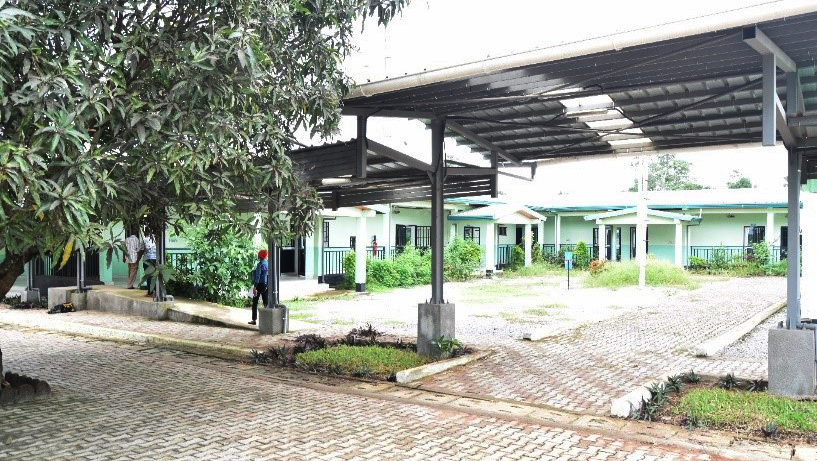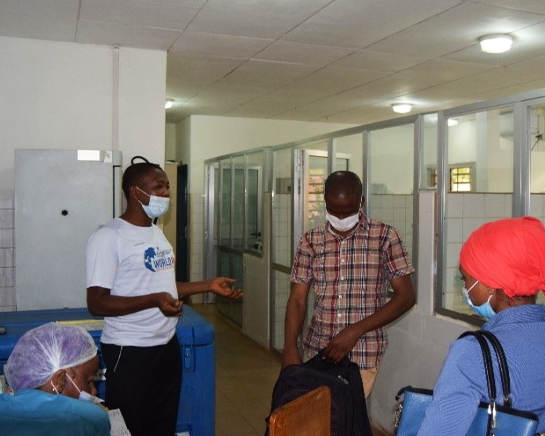Understanding What Causes Fever to Reduce the Spread of Dangerous Pathogens

Posted in GUMC Stories | Tagged Center for Global Health Science and Security, fever, global health, pandemic, pandemic preparedness, research
(September 23, 2021) — Fever is one of the most common and recognizable signs of human disease, but remains surprisingly mysterious from an etiological perspective. In some regions of the world where fevers are common, identifying their causes could reduce the risk of exposure to dangerous pathogens, especially those originating in animals.

Understanding these causes is the aim of a new project in Guinea being led by researchers in the Center for Global Health Science and Security (GHSS) at Georgetown University Medical Center.
The work, funded by a $2.8 million, three-year award from the U.S. Defense Threat Reduction Agency, allows investigators to seek out the root causes of acute febrile illness, or AFI (a rapid onset of fever along with symptoms such as headache, chills, joint pain and respiratory symptoms). The outcomes will allow the research team to build capacity for prevention, detection and response to infectious diseases through an integrated human-animal surveillance approach.
“This project will provide fundamental baseline knowledge of pathogens circulating and potentially causing human illness, as well as those of veterinary concern, and develop recommendations for national and regional risk reduction strategies to improve human and animal health,” explains the project lead, Claire J. Standley, PhD, MSc, associate research professor in the GHSS.
Pathogens of Pandemic Potential
Many of the pathogens that cause AFI are difficult to diagnose, and there is little effort to do so. Malaria is often presumed to be the cause of fever in countries where it’s endemic, Standley says, making such countries vulnerable to unexpected outbreaks. “Uncovering the causes of fever provides an opportunity to conduct fundamentally important public health research.”



The ongoing COVID-19 pandemic, the resurgence of Ebola in February 2021, and the recent Marburg virus outbreak also underscore the importance of establishing robust and sustainable diagnostic platforms for detecting unusual or unexpected pathogens of pandemic potential.
Erin Sorrell, PhD, MSc, a GHSS researcher and co-investigator, says the work will leverage investments made during and after the Ebola virus disease outbreak in Guinea, particularly with respect to laboratory infrastructure. “It also will provide a platform through which we can enhance and sustain capacities for cutting-edge research to support strong health security systems,” she says.
In addition to strengthening Guinea’s research infrastructure and ability to diagnose the cause of fever, this research will improve the country’s ability to manage emerging diseases, says Alpha Mahmoud Barry, MD, MSC, DrPH, public health specialist with Sante plus Organisation in Guinea and the co-principal investigator on the study.
“This research project is of paramount importance given the reemergence of diseases with epidemic potential in the country, in a context of poverty, making it difficult to diagnose cases of fever, which represent the first sign mentioned in consultation in health care facilities in Guinea,” Barry says.
Mitigating Outbreaks
Working with the National Center for Training and Research in Rural Health in Guinea, the researchers will test blood samples from patients presenting at hospitals with febrile illness for a suite of pathogens associated with fever, while partners at the Higher Institute for Veterinary Science and Medicine assess the animals (bats, dogs, livestock and rodents) with which the patients may interact. Laboratory results will be compared to the presumptive clinical diagnoses, as well as past and current surveillance records.
“Most emerging infectious diseases in humans have links to the animal world,” explains GHSS researcher Ellen P. Carlin, DVM, also a co-investigator in this work. “If we can uncover what these zoonotic pathogens are and how the relationships between people and animals can lead to outbreaks, we will be much better positioned to mitigate and even prevent them,”
The research team, co-led by investigators at Santé Plus Organisation, a Guinean public health NGO, will also conduct socio-behavioral questionnaires on participants both with and without active fever to ascertain risk factors that might be associated with exposure to zoonotic pathogens.
The work will serve to strengthen multisectoral collaboration across various ministries. In addition, by partnering with the University of Pretoria for laboratory training and EcoHealth Alliance staff in Liberia for animal sampling support, it will enhance trans-African research networks. The project will support the goals of Guinea’s National One Health Platform, National Action Plan for Health Security, and Integrated Disease Surveillance and Response strategy, and provide a basis for future detection, surveillance and threat-reduction activities.
“We’re excited to have the opportunity to continue our collaborations in Guinea and work with outstanding partners across multiple sectors and disciplines in the U.S., Guinea and South Africa,” Standley concludes.
Collaborators on this work include: Billy Karesh, DVM, and Jim Desmond, MS, DVM, of EcoHealth Alliance; Marietije Venter, PhD, University of Pretoria; Abdoul Beavogui, PhD, National Center for Training and Research in Rural Health; and Yacouba Konaté, DES, MSc, Higher Institute for Veterinary Science and Medicine. Additional support provided by the National Public Health Institute in Guinea and the Guinean Laboratory for Viral Hemorrhagic Fevers.
Additional support provided by Rebecca Katz, PhD, Alexandra Phelan, SJD, LLM, LLB, and Colin Carlson, PhD, and from Zoumana Isaac Traoré, a Georgetown graduate student.
